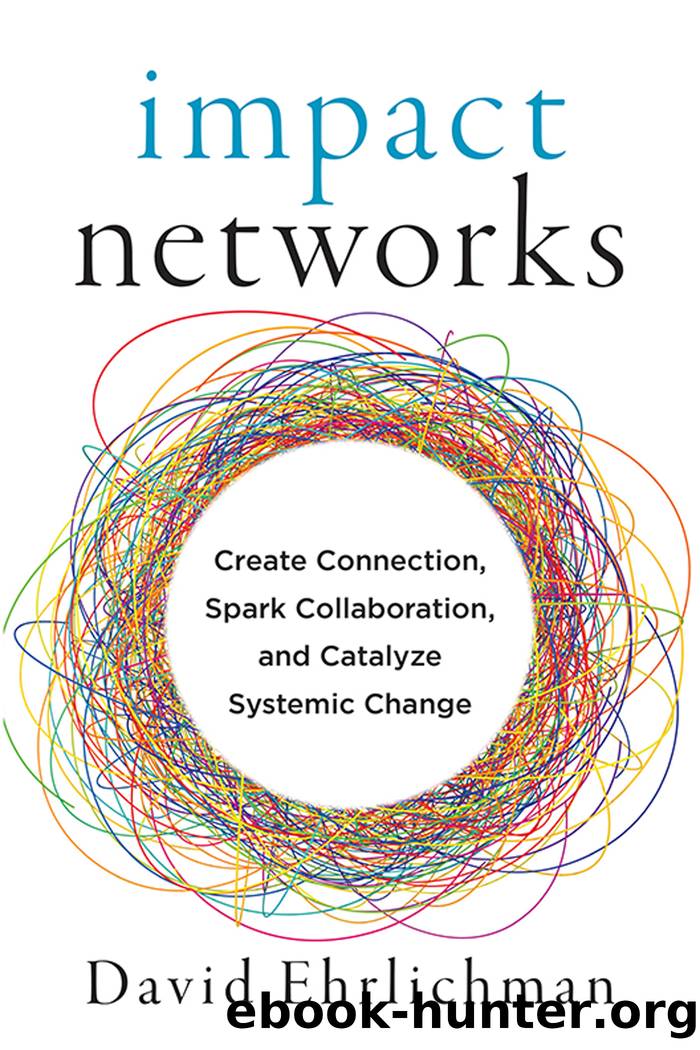Impact Networks by David Ehrlichman

Author:David Ehrlichman [David Ehrlichman]
Language: eng
Format: epub
Publisher: Berrett-Koehler Publishers
Published: 2021-10-12T00:00:00+00:00
CHAPTER 7
Cultivate Trust
A community is the mental and spiritual condition of knowing that the place is shared, and that the people who share the place define and limit the possibilities of each otherâs lives. It is the knowledge that people have of each other, their concern for each other, their trust in each other, the freedom with which they come and go among themselves.
âWENDELL BERRY, âTHE LOSS OF THE FUTUREâ
Trust has become something of a buzzword. Most people will acknowledge that itâs important, yet many see it as a by-product of other activities, rather than something that should be cultivated deliberately. On the contrary, the web of connections that develops between participants is the invisible structure that holds impact networks together, and a failure to cultivate trusting relationships is where many networks fall short. Trust is the element that makes possible all of a networkâs other virtues and accomplishments. Specifically:
Trust creates cohesion while a networkâs more formal structures and processes are being formed. Given the benefits of defining an impact networkâs structure as it develops (as opposed to defining its structure in advance, as in a hierarchy), networks are unlikely to have many formal agreements in the early stages of their evolution. During this time, it may be difficult for some participants to sit with the ambiguity.
Trusting in each other and in the network helps people to be more comfortable with emergenceâto explore, experiment, reflect, and self-correct in real time. People also become more willing to share information and take risks. Trust is the glue that keeps a network together as participants develop additional structures for organizing themselves.
Trust increases the networkâs collective intelligence and avoids the pitfalls of conformism and groupthink. Under the right conditions, networks are capable of thoughtful discernment and collective intelligence greater than that of any single individual. Lack of openness to othersâ perspectives is arguably the greatest obstacle to a networkâs ability to think and act intelligently. Our tendency, in the absence of trust, is to believe that our assumptions and projections are valid, that we know what others are thinking and feeling without asking them, and that maybe we are the only sane person in the room. Trust increases the likelihood that participants will listen with care, try on new perspectives, and engage with people they might consider to be very different from themselves.
Trust expands the range of possible conversations. People who trust each other are more forthright, more likely to share information, and more likely to show creativity in how they collaborate.1 With sufficient trust, people are better able to navigate through uncomfortable conversations and test each otherâs assumptions without fear of harm. As a result, new perspectives are considered, and conflict becomes generative rather than destructive. The networkâs ability to engage in constructive dialogue and make informed decisions grows as people feel free to speak their mind and acknowledge difficult realities or controversial points of view.
This shift has been critical to the success of the Clean Electronics Production Network (CEPN), a program of
Download
This site does not store any files on its server. We only index and link to content provided by other sites. Please contact the content providers to delete copyright contents if any and email us, we'll remove relevant links or contents immediately.
Zero to IPO: Over $1 Trillion of Actionable Advice from the World's Most Successful Entrepreneurs by Frederic Kerrest(4569)
Machine Learning at Scale with H2O by Gregory Keys | David Whiting(4313)
Never by Ken Follett(3957)
Harry Potter and the Goblet Of Fire by J.K. Rowling(3857)
Ogilvy on Advertising by David Ogilvy(3622)
Shadow of Night by Deborah Harkness(3368)
The Man Who Died Twice by Richard Osman(3079)
Book of Life by Deborah Harkness(2939)
The Tipping Point by Malcolm Gladwell(2922)
Will by Will Smith(2920)
Purple Hibiscus by Chimamanda Ngozi Adichie(2853)
0041152001443424520 .pdf by Unknown(2845)
My Brilliant Friend by Elena Ferrante(2831)
How Proust Can Change Your Life by Alain De Botton(2814)
How to Pay Zero Taxes, 2018 by Jeff A. Schnepper(2655)
Hooked: A Dark, Contemporary Romance (Never After Series) by Emily McIntire(2554)
Rationality by Steven Pinker(2364)
Can't Hurt Me: Master Your Mind and Defy the Odds - Clean Edition by David Goggins(2341)
Borders by unknow(2315)
